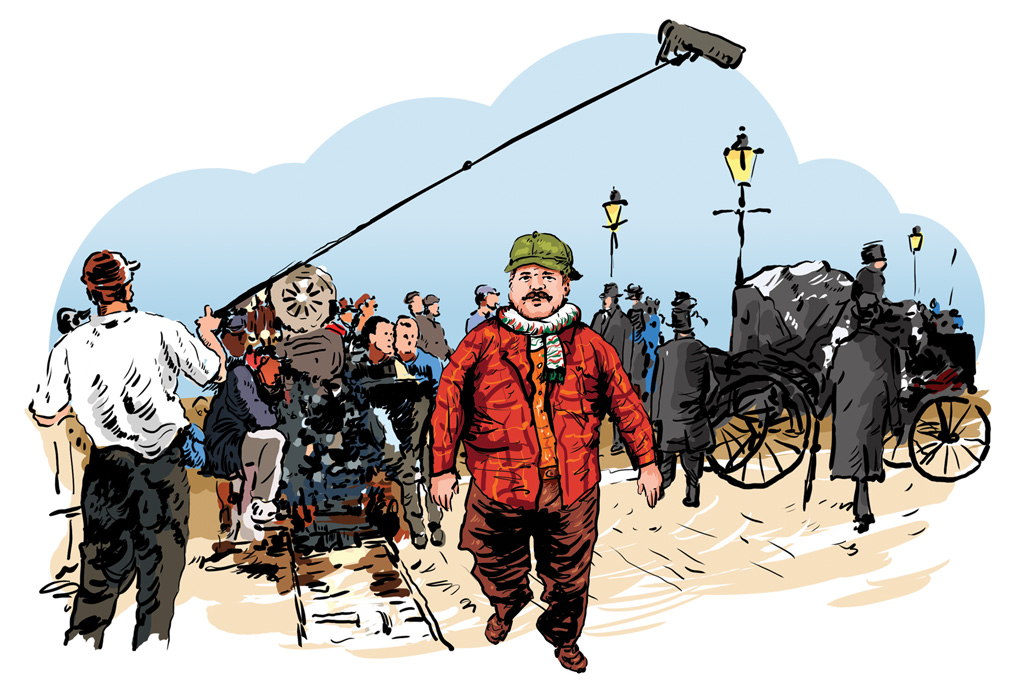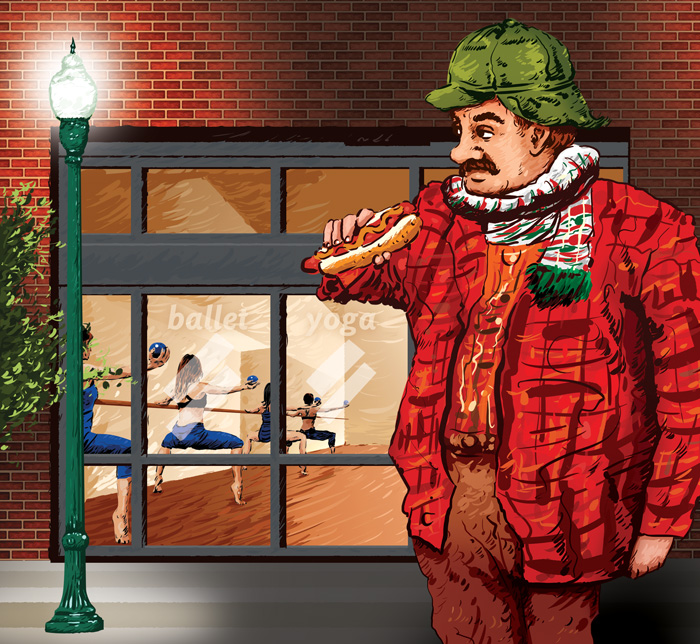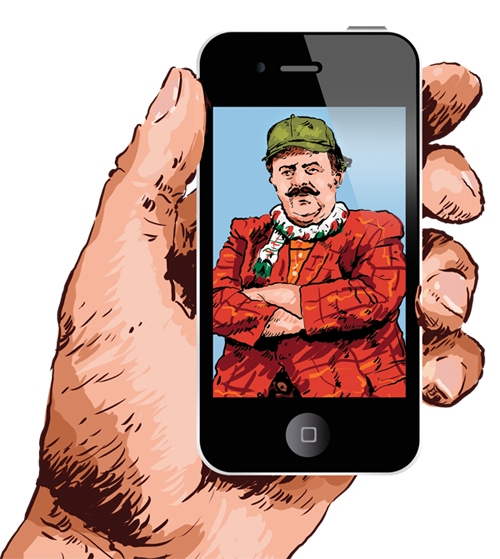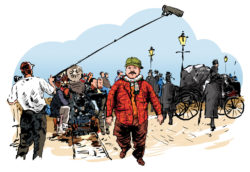Magazine
Ignatius in the New New Orleans
Imagining “A Confederacy of Dunces” in 2016, and reexamining the motivations and misadventures of its protagonist. The final installment of our Pulitzer Prizes Centennial Campfire initiative.
Published: December 1, 2016
Last Updated: October 22, 2025

Illustration by Toan Nguyen

From the shadow of the building, Ignatius J. Reilly’s supercilious blue and yellow eyes scanned Canal Street, studying the passersby before him with distaste: a group of women in skin-tight latex, a spectacled Negro boy wearing garish red headphones, a man in a tiara. All unforgiveable offenses against taste and decency. Yet, the whole street seemed somehow distant, changed. The shapes of the cars rolling by and the signs affixed to the facades within his line of sight were alien to him. The entire milieu lacked theology and geometry. Ignatius noticed that the D. H. Holmes department store clock had stopped. No doubt the cretin responsible for its care and maintenance was shirking his duty, most likely chatting up some doxy in the lingerie department. Ignatius cast his singular eyes toward his bloated feet, which were bloated because he had lost track of time thanks to the useless clock. He would find the supervisor of the maintenance department and make his displeasure at this effrontery known. Such insolence could not be left unchallenged. As Ignatius stepped into the building, he considered how he would assemble his retinue of lawyers to handle the matter. The Holmes company would be left penniless. But first, he would stop at the store café and buy two dozen delicious sweet macaroons and perhaps some chicory coffee. Shortly thereafter, there would be significant repercuss—
Ignatius brought his bulging, elephantine body to a full stop and dropped his bag of sheet music from Werlein’s. He gaped in abject horror. The familiar interior of the department store was gone. It had been replaced by what appeared to be a rather jejune hotel.
“How dare they!” Ignatius exclaimed.
If Ignatius J. Reilly, John Kennedy Toole’s portly, flatulent, iconoclast of a medievalist protagonist, were to appear on the streets of modern New Orleans, he would, as always, be disturbed and dismayed by the sweeping changes the city has undergone. At his core, Ignatius is a traditionalist, even a conservationist. He had a difficult time processing the fast-paced, dynamic world of 1960s New Orleans with its vibrant and diverse citizenry. How much harder would it be for him to deal with New Orleans of the early 21st century? What would he make of the disappearance of the shops he took for granted, the cobblers, the furriers, the sheet-music sellers? How would he react to the dozens of skyscrapers that replaced those shops? What would he feel as he monitors the reduced downtown crowds, people ignoring each other as they stare at their devices? Ignatius J. Reilly would be outraged, and we would be in for a wild, picaresque adventure worthy of Don Quixote.The story of Toole, Ignatius, and A Confederacy of Dunces is well-known by now. The story of Toole’s life and death has perhaps the greatest sweep of any author in history. A native New Orleanian, he wrote the book, failed to sell it to an ambivalent New York establishment, and committed suicide in 1969 believing he was a complete failure. His mother, Thelma Toole, spent the better part of the next decade submitting the book to publishers and receiving rejections. Through letters and calls, Mrs. Toole badgered the legendary Walker Percy, who had joined the faculty of Loyola University of New Orleans. And when Percy’s term at Loyola was nearly up, Mrs. Toole forced her way into Percy’s office and convinced him to read the manuscript. Percy, to his surprise, found the book amazing and became its champion. Louisiana State University Press published the novel in 1980, and it received a Pulitzer Prize for Fiction the following year.
Ignatius is certainly a unique character, possibly one of the most caustic and irascible protagonists in all of fiction. He insults everyone he meets. He lobs particularly awful insults at women, minorities and his poor, put-upon mother, often in an offhand manner. He is self-destructive, and his behavior virtually always creates painful fallout for anyone in the vicinity. Ignatius is the crazy drunk uncle who ruins Thanksgiving every year. Yet, although some readers find Ignatius so repugnant they are unable to finish the book, it would be wrong to condemn him; he’s too complex for such a simple reading.

Illustration by Toan Nguyen
Seemingly born in the wrong century, Ignatius quotes Boethius and rails against modern ethics even as he demonstrates a keen understanding of contemporary New Orleans society. A Confederacy of Dunces is special not only because it’s very funny, but because it’s one of a rare category of novels that ever attempted and succeeded in getting New Orleans right. Relatively few books have attempted to capture the singular nature of the Crescent City, a hamlet where, through some magic process, the sun rises on the Westbank, and the best way to look suspicious in the French Quarter is to walk around completely sober. Colloquial accents that had never appeared in literature are presented with scholarly precision. The social scene and religious politics of the town are depicted appropriately and promptly turned on their heads. The world is introduced to people who are unlike any others.
Toole had a difficult home life. He was an exceptionally bright boy. Mrs. Toole pushed him to excel at his studies and to serve as entertainment for visitors. Mr. Toole was unassuming, and Mrs. Toole considered her husband a financial and social failure. As such, the family had little money and John Kennedy Toole, or Ken as his family called him, was the provider. Some evidence indicates that Toole found his mother overbearing and narcissistic. Certainly, it appears that Toole found his periods away from home—such as his Army service in Puerto Rico, where he began writing Confederacy—liberating. But Toole dutifully returned to his parents’ home and continued to support them. By 1968 his students at Tulane noticed that his lectures occasionally turned quite dark. He even drew a “doomsday clock” on the chalkboard. The hour hand steadily rotated toward midnight as the semester progressed. No one knew what to make of it.Confederacy satirizes New Orleans’s family dynamics, nightlife, commerce, LGBT community, Civil Rights–era African Americans, the poor, juvenile delinquents, and “Yats,” working class New Orleans with dialects reminiscent of twentieth-century Brooklyn, all of which Toole had some familiarity with in real life. Claude Robichaux, the pensioner, bears some similarities to Toole’s mild-mannered father. At first glance, it appears that Toole avoids skewering his mother. Ignatius’s long-suffering, alcoholic mother, Irene, is in many ways the opposite of Mrs. Toole. Irene speaks with a classic (and amazingly accurate) Yat accent. She keeps a bottle of wine in the oven, which she often accidently burns before drinking. She wears rundown wedges and garish tops. In contrast, Thelma Toole taught elocution when she was young and spoke in the kind of mannered southern drawl associated with Scarlett O’Hara. She went out of her way to present herself as cultured and sophisticated, a model of middle-class manners, and blamed Mr. Toole for the family’s lack of improvement in financial and social status. In other words, Toole hits everyone with his magnificent wit, but not his mother. That is, unless you consider Ignatius’s constant railing against bourgeois values.
Ignatius plays mad on every page, but like Hamlet, it’s only a ruse.
Ignatius is against social climbing and self-improvement, counter to Irene’s urging. He believes that a job will stifle his innate genius and interfere with the completion of his literary masterpieces. He believes the poor, such as bar porter Burma Jones, are better off in poverty, because poverty is good for the soul. In his journal, Ignatius extolls the Boethian ideals of self-denial and suffering as the cornerstones of a good life.
However, Ignatius is not a sincere penitent. He likes his Dr. Nut sodas and matinee movies too much to be considered an ascetic. Self-denial is not his primary characteristic; impudence is. Beyond insulting and manipulating every character in the book, he breaks so many laws it’s difficult to keep track of his offenses: loitering outside of D. H. Holmes; resisting Officer Mancuso’s arrest; theft of Levy Pants’ proprietary business files and office supplies; theft of presumably dozens of Paradise Vendors hot dogs; multiple counts of disturbing the peace at the movie theater and in his neighborhood; contributing to the delinquency of a minor by tricking George, the juvenile delinquent, into minding the hot dog cart while he goes to the movies; public indecency in continuing to wear clothes that no longer fit his rapidly expanding body; criminal damage to property when he breaks the doors on Dorian Greene’s slave quarters and again when he romps around Dorian’s party knocking over people and objects, and so on and so on. Let’s not even mention Ignatius violating city health ordinances—and common sense—by stuffing a feral cat into his hot dog cart. Ignatius is a bowling ball that knocks over the tenpins of decorum and political correctness wherever he goes.
For example, Ignatius won’t win a Civil Rights awards any time soon. Following his first encounter with the mostly African-American factory workers at Levy Pants, he pens this gem in his journal: “Were they in the picking stage of their evolution, they would at least be in the healthful outdoors singing and eating watermelons.” But Ignatius allows that:
I may be wrong. I would imagine today people grasp for the cotton with one hand while the other hand presses a transistor radio to the sides of their heads so that it can spew bulletins about used cars Sofstyle Hair Relaxer and Royal Crown Hair Dressing and Gallo wine about their eardrums, a filtered menthol cigarette dangling from their lips and threatening to set the entire cotton field ablaze.
Ignatius later inserts himself into this whirlwind of corrosive stereotypes: “If I were a Negro, I would not be pressured by my mother to find a good job, for no good jobs would be available. My mother herself, a worn Negress, would be too broken by years of underpaid labor as a domestic to go out bowling at night.” It’s likely that any protagonist in a modern book spouting opinions like these would be subject to a boycott.
Of course, Ignatius should not shoulder the blame for the generally impudent nature of the text. The point of view is omniscient and allows the reader to meet a whole host of potentially offensive characters. Take Burma Jones, the vagrant-turned-janitor. On one level, Jones seems like the worst kind of stereotype of a black male. He’s arrested for vagrancy within a few lines of his first appearance and his manner of speaking could be described as “young Eddie Murphy does his best impression of Buckwheat from Little Rascals.”
But Toole does something novel with Jones. Jones seems perfectly aware that he’s a stereotype. Better still, he seems aware that he’s perceived as a stereotype. Take, for example, an early scene where Jones is riding the bus in search of work: “Look at that old gal . . . [S]he think cause I color I gonna rape her. She about to throw her grammaw ass out the window. Whoa!”
Jones is often unwilling to accept others’ biased perception of him. When his new boss, the comically unethical nightclub owner Lana Lee, orders him to remove his trademark sunglasses, he responds, “The glasses stayin on . . . For twenty dollar a week, you ain running a plantation in here.” Lana later insults Jones, to which he replies: “Say, who you callin ‘boy’? . . . You ain Scarla O’Horror.” Finally, Jones’s social consciousness is broader and more accurate than arguably any other character in the book. When Lana accuses him of laziness, he counters: “Listen, you ever try livin on my kinda wage? You think color peoples get grosseries and clothin at a specia price? . . . Whoa! Where I live, you know how peoples buy cigarette? Them people cain affor a whole pack, they buy they cigarette separate two cent apiece.” Jones’s ability to see himself through the eyes of those who perceive him with amused contempt and pity is the very definition of double consciousness as described by W. E. B. Du Bois in his seminal 1903 book, The Souls of Black Folk. Other works, such as Richard Wright’s Native Son and especially Ralph Ellison’s magnum opus Invisible Man, previously explored this idea in fiction. But it was rare (and arguably still unusual many decades later) for a white author to delve into this racial thicket. Jones may be an offensive stereotype, but he’s an offensive stereotype in a satire where virtually none of the other characters have any meaningful level of self- or social-awareness. Whereas Ignatius floats through the book living in a medieval fantasy, Jones is very much a man of his times who employs logic and gumption to obtain the outcome he desires.
The book’s attitude toward its LGBT characters is similarly ambivalent. Ignatius refers to Dorian Greene and his party-going friends as perverts, degenerates, deviates or sodomites. As with the African American characters, Ignatius does not see them as individuals or real people so much as props to be used in his schemes to outmaneuver his misguided, social-activist girlfriend, Myrna Minkoff. After Ignatius tries and fails to lead his vassals in the Crusade for Moorish Dignity, he plans to concoct a pan-national military coup using gay men as sleeper agents: “Good grief. How many of the military leaders of the world may simply be deranged old sodomites acting out some fake fantasy role? Actually, this might be quite beneficial to the world. It could mean an end to war forever.”
Of course, Ignatius is the one “acting out some fake fantasy role.” Dorian understands this innately and channels Ignatius’s political aspirations in a more entertaining direction. Like Jones, Dorian has an identity completely independent of Ignatius, which suggests that he also has a high degree of self-awareness. This self-awareness is important because so many of the other featured characters—Ignatius, Irene, Myrna—appear to be entombed in the echo chambers of their own ideologies. Dorian wants to have a good time and is an expert at shepherding his own happiness. In an interesting reversal, it is Dorian who manipulates Ignatius into providing the theme and free entertainment for a big party. That Ignatius causes a scene is no surprise to Dorian. When Ignatius rams his body through the door of Dorian’s slave quarters, Dorian does not raise an eyebrow: “What can you expect from him? Just look at him.”

Illustration by Toan Nguyen
With his impulsive overreactions and lack of tact, Ignatius is the perfect lead for a brilliant satirical book, but he is virtually friendless. Why? Twice in the novel, Toole pulls back the curtain and allows the reader to see the pain behind Ignatius’s bizarre worldview. During Dorian’s party, Ignatius briefly recalls a traumatic and embarrassing childhood incident at school wherein he burned off his eyebrows and wet himself. In a rare turn, these events are described without caustic sarcasm or any attempt to divert the topic. This recollection is foreshadowing, because immediately afterwards Ignatius is bullied by Dorian’s lesbian neighbors, the ridiculously macho Frieda Club, Betty Bumper, and Liz Steele, and he is expelled from the party.
There is another connection to Quixote here. The Man of La Mancha is said to have gone mad after reading too many romantic books about valorous knights. Several characters in Confederacy point out that Ignatius, too, is over-educated, which implies that Ignatius himself read too many books about St. Martin de Porres, the patron saint of mulattoes, and Fortuna, whose wheel of fate is always spinning in unexpected directions. But this does not explain what caused Ignatius to lose himself in religious esoterica. It likely has something to do with his home life, which was as difficult, in its way, as Toole’s.
Near the end of the novel, Toole provides the reader with the supposed turning point in Ignatius’s life, the origin story for all the madness on the page. When Ignatius’s former boss, Gus Levy, comes searching for him, Ignatius’s shell-shocked neighbor, Miss Annie, explains how things fell apart in the Reilly household: “Lemme tell you something. I gotta be fair. That Ignatius was okay until that big dog of his died. . . . So Ignatius goes over to the priest and ax him to come say something over the dog . . . The priest says no, of course.” Miss Annie also mentions that Irene began drinking around this time. But what she does not mention is the precursor event to these troubles. Earlier, the text informs the reader that Ignatius’s father died. It’s implied that the death of Ignatius’s father, the death of his dog, and the birth of his oddball persona all occur around the same time. A heartbroken young man becomes a crusader against the hypocrisy and bad taste of the modern world.Modern New Orleans is full of heartbroken people. The city is presently undergoing massive urban “renewal”—what some call gentrification. With the influx of undocumented migrant workers in the aftermath of Hurricane Katrina and the continuation of a blatantly unequal educational system, the city’s rampant poverty persists. Racial tensions remain, with protests against police violence, racist monuments, and unfair immigration policies regularly occurring. None of these issues are advertised in the city’s marketing campaigns, and much of New Orleans’s inequity seems completely unchallenged by those in power.
This is why Ignatius is such an indelible character. His most endearing traits are his love of outsiders and his visceral rejection of injustice. If Ignatius rematerialized on Canal Street today, he would likely wind up in a throng of young activists. Or maybe he would find a job working alongside the underpaid kitchen staff of a tourist-trap restaurant. Or possibly he would find comfort among the homeless sheltering in Duncan Plaza. While we can’t know exactly what would happen if Ignatius returned, we can bet it would be a brilliantly comic adventure.
This article was made possible by the 2016 Pulitzer Prize Centennial Campfires Initiative, a program to commemorate the 100th anniversary of the Prizes in 2016. Announced by the Pulitzer Prize Board, the Campfires Initiative aims to ignite broad engagement with the journalistic, literary, and artistic values the Prizes represent. The board partnered with the Federation of State Humanities Councils on the initiative and awarded more than $1.5 million to forty-six state humanities councils. The Louisiana Endowment for the Humanities received $34,000 to support articles in Louisiana Cultural Vistas and public programs around the state about Pulitzer winners with ties to Louisiana. On December 8, 2016, the LEH will debut “An Ignatian Journey,” a digital map of A Confederacy Dunces and the life of John Kennedy Toole, produced in partnership with LSU Press.

